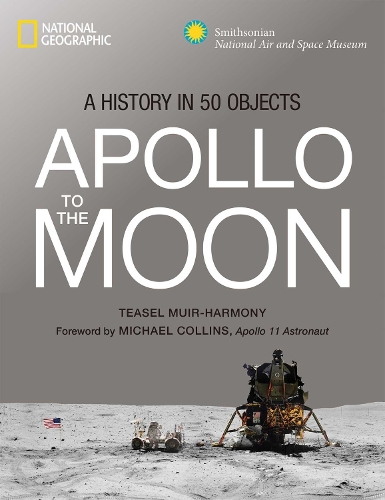
Apollo: To the Moon in 50 Objects
(Hardback)
Publishing Details
Apollo: To the Moon in 50 Objects
By (Author) Teasel E. Muir-Harmony
National Geographic Society
National Geographic Society
15th November 2018
United States
Classifications
General
Non Fiction
Popular science
629.45
Physical Properties
Hardback
304
Description
A celebration of the 50th anniversary of NASA's Apollo missions to the moon, this narrative uses 50 key artifacts from the Smithsonian archives to tell the story of the groundbreaking space exploration program. A celebration of the 50th anniversary of NASA's Apollo missions to the moon, this narrative uses 50 key artifacts from the Smithsonian archives to tell the story of the groundbreaking space exploration program. Bold photographs, fascinating graphics, and engaging stories commemorate the 20th century's most important space endeavor- NASA's Apollo program to reach the moon. From the lunar rover and a survival kit to space food and moon rocks, it's a carefully curated array of objects--complete with intriguing back stories and profiles of key participants. This book showcases the historic space exploration program that landed humans on the moon, advanced the world's capabilities for space travel, and revolutionized our sense of humanity's place in the universe. Each historic accomplishment is symbolized by a different object, from a Russian stamp honoring Yuri Gagarin and plastic astronaut action figures to the Apollo 11 command module, piloted by Michael Collins as Armstrong and Aldrin made the first moonwalk, together with the monumental art inspired by these moon missions. Throughout, Apollo to the Moon also tells the story of people who made the journey possible- the heroic astronauts as well as their supporters, including President John F. Kennedy, newsman Walter Cronkite, and NASA scientists such as Margaret Hamilton.
Reviews
But this book is, in fact, much more than a compendium of gorgeous photographs of iconic objects in stasis. Through her particular selection of non-obvious, non-iconic objects, Muir-Harmony gestures to the stories and backstories that havent been told about the Apollo missionthis tangible object, her book, is a fine place to begin to understand Apollo. Los Angeles Review of Books
The moon landing is a matter of public memory, which is another way of saying that its contested history. In 1971, Collins became the director of the Smithsonians National Air Museum, overseeing the addition of Space to its name in 1976, and he provides the introduction toAPOLLO TO THE MOON: A History in 50 Objects The New York Times
This remarkable book by Teasel Muir-Harmony, a curator at the Smithsonian National Air and Space Museum, tells the story of the technical and human aspects of the Apollo program through a series of objectsFrom the forward by Michael Collins, command module pilot onApollo 11, to the closing comments of Buzz Aldrin, the lunar module pilot on the same mission, readers are in for a stunning ride through the familiar and the surprising. Physics Today
"This clever and intriguing artifact key to Apollo makes the legendary missions feel human and freshly astonishing." Booklist
The saga of NASAs glory days, illustrated with artifacts from the Smithsonian National Air and Space Museum. GeekWire
There is something here for everyone from the person who doesn't know about these missions at all to the person who is looking to fill in the spaces of their knowledge. Lit and Life
"It is very rare for me these days to read a book in print but for this Im glad that I made the exception. Its gorgeous, in its own geeky-techie-nostalgic way, and I am glad to have it on my shelves to pick up and dip into, over and over again." - Reading Reality
The entire book is beautifully done, from the photographs to the people and items that were included, each focusing on a different mission or important event, I loved looking through this book. Books Are My Thing
a book to be browsedand savored. From the TBR Pile
I live in the town that the space program built. Most of our schools are named after either astronauts or shuttles. My husband is an aerospace engineer, my mother works for the U.S. Space and Rocket Center and we all drive past a Saturn V on a daily basis. With the space program being so much a part of my day to day life, I figured there wasnt much this book could teach me but I was so wrong! I Wish I Lived in a Library
Author Bio
TEASEL E. MUIR-HARMONY, curator at the Smithsonian National Air & Space Museum, is a distinguished scholar of space history. She earned a Ph.D. from MIT, writing a dissertation on the political implications of the Apollo program. She has published more than a dozen articles and book reviews, and has presented internationally on various topics in the cultural history of 20th-century space science.
